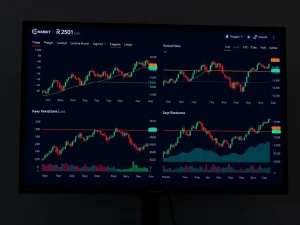Landmark Vanuatu Crypto Laws: A Stricter Approach to Digital Asset Regulation

In a significant move for the Pacific region, Vanuatu has officially enacted its long-awaited cryptocurrency legislation. Stepping away from the ‘light touch’ approach often seen in emerging crypto jurisdictions, Vanuatu’s new crypto regulation framework is designed to be robust and deterrent. This decisive action signals a clear message: Vanuatu is serious about fostering a secure and regulated digital asset environment, prioritizing investor protection over lax oversight. Let’s delve into what these landmark laws entail and what they mean for the future of crypto in the Pacific and beyond.
Why Vanuatu’s Stringent Crypto Laws Matter?
Why has Vanuatu opted for such a firm stance on crypto regulation? Loretta Joseph, a key advisor in the development of these laws, puts it bluntly: to ward off bad actors. Small island nations can be vulnerable to exploitation by entities seeking jurisdictions with minimal regulatory hurdles. Vanuatu is determined to avoid becoming a haven for scams and illicit activities, especially after witnessing the fallout from the FTX collapse, which highlighted the dangers of inadequate oversight in the crypto space. This proactive approach aims to build trust and legitimacy in Vanuatu’s burgeoning digital economy.
Key Highlights of the New Digital Asset Licensing Regime
The Vanuatu crypto laws, officially known as the Virtual Asset Service Providers Act, introduce a comprehensive licensing regime overseen by the Vanuatu Financial Services Commission (VFSC). Here’s a breakdown of what this entails:
- Broad Scope: The legislation covers a wide range of crypto businesses, including exchanges, NFT marketplaces, crypto custodians, and entities conducting Initial Coin Offerings (ICOs).
- Bank Integration: Notably, the law permits banks to obtain licenses to offer crypto exchange and custody services, potentially bridging the gap between traditional finance and the digital asset world.
- FATF Compliance: Vanuatu is aligning itself with international standards by mandating compliance with the Financial Action Task Force’s (FATF) guidelines on Anti-Money Laundering (AML), Counter-Terrorism Financing (CTF), and the Travel Rule for crypto firms.
- Sandbox Environment: To encourage innovation while maintaining control, the VFSC is authorized to create a regulatory sandbox. This allows approved companies to test and offer various crypto services within a controlled environment for up to a year, with potential for renewal.
Enforcement and Penalties: No Room for Error
Vanuatu’s commitment to strict crypto regulation is underscored by the significant enforcement powers granted to the VFSC. The penalties for non-compliance are substantial, designed to act as a powerful deterrent:
- Hefty Fines: Fines can reach up to 250 million vatu, equivalent to approximately $2 million USD.
- Imprisonment: Individuals found in violation of the law could face prison sentences of up to 30 years.
These severe penalties send a clear message that Vanuatu is not taking regulatory compliance lightly. As Loretta Joseph emphasized, “God help any scammer that goes into Vanuatu because you’ll go to jail.”
What About Stablecoins, NFTs, and CBDCs?
While the new legislation is comprehensive, it’s important to note its current scope. According to the VFSC, the digital asset licensing framework does not directly address stablecoins, tokenized securities, or central bank digital currencies (CBDCs). However, the VFSC acknowledges that these asset types may share similarities with virtual assets and could be subject to future regulatory considerations as the crypto landscape evolves.
The Journey to Vanuatu’s Crypto Legislation
The path to enacting these Vanuatu crypto laws has been a long one, demonstrating the government’s considered approach. Development began in 2020, facing delays due to government transitions, natural disasters, and the global COVID-19 pandemic. Initially expected to pass in September of the previous year, the legislation finally became law in March. This extended timeline underscores that Vanuatu’s regulatory framework is not a rushed response but a carefully constructed system designed to address the unique challenges and opportunities presented by digital assets.
Benefits and Opportunities: Financial Inclusion and Innovation
Despite the stringent nature of the regulations, Vanuatu anticipates significant benefits from establishing a clear legal framework for digital assets. The VFSC highlights that these laws are expected to:
- Unlock Opportunities: Create a conducive environment for legitimate crypto businesses to operate within Vanuatu.
- Enhance Financial Inclusion: Facilitate regulated crypto services for cross-border payments, potentially improving financial access for citizens.
Looking Ahead: Vanuatu as a Crypto Regulation Leader in the Pacific?
Vanuatu’s proactive and robust approach to digital asset licensing positions it as a potential leader in crypto regulation within the Pacific region. By prioritizing investor protection and regulatory clarity, Vanuatu aims to attract responsible crypto businesses and foster a sustainable digital economy. While the laws are undeniably strict, they are designed to provide a secure and regulated environment for innovation and growth in the digital asset space. This landmark legislation could serve as a model for other small nations seeking to navigate the complexities of the evolving crypto world, demonstrating that strong regulation doesn’t have to stifle innovation but can instead be its foundation.









